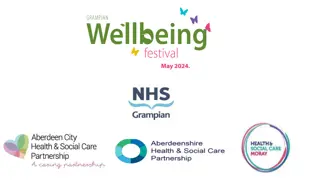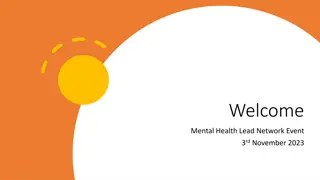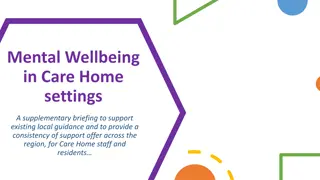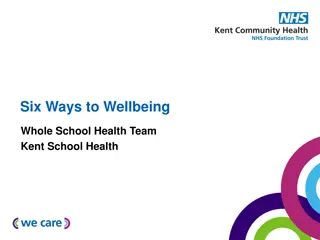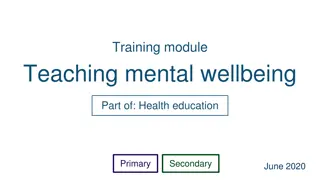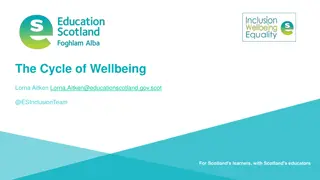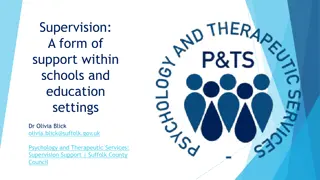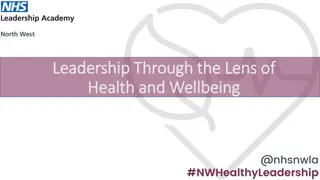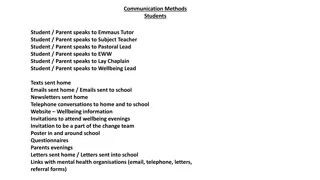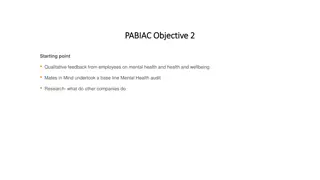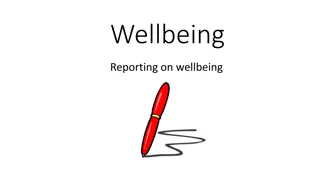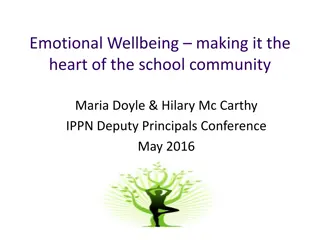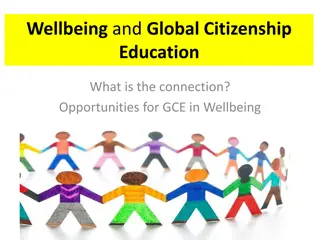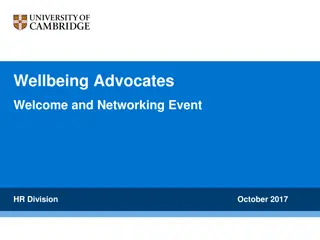Supporting Mental Wellbeing in Challenging Times
In the midst of the Covid-19 pandemic, it's important to address how the current situation has impacted mental health, both for children and adults. Recognizing signs of low mental health and understanding the influence of our brains on our emotions is crucial. Discover the key question of taking action when feeling low and explore ways to improve mental health, including the five ways to wellbeing. Empower yourself with tools to enhance your mood and overall mental health.
Download Presentation

Please find below an Image/Link to download the presentation.
The content on the website is provided AS IS for your information and personal use only. It may not be sold, licensed, or shared on other websites without obtaining consent from the author. Download presentation by click this link. If you encounter any issues during the download, it is possible that the publisher has removed the file from their server.
E N D
Presentation Transcript
5 Ways to Wellbeing Resource Assembly PPT
Use if appropriate Coronavirus/Covid19 Coronavirus has affected how we do a lot of things. Many people have stayed in the UK over the summer holiday. We have had to wash hands and stay at home more. We haven t been able to spend time with our friends as much. Adults have had to wear face masks when shopping. What is Coronavirus/Covid19? KS1and LKS2 Video: https://www.youtube.co m/watch?v=RHnU6LTWh 6g UKS2 Video: https://www.youtube.com /watch?v=MVvVTDhGqaA
This situation can make you feel sad, lonely and cross but it s ok to not be ok. All of this has impacted on everyone s mental health - both children and adults. Could you spot someone who is feeling low? How would you know? What might you see? On a child or adult s face?
We are told that feeling low will have an impact on our Mental health. Our brains manage how we feel. How we feel has an impact on our physical and mental health. If we are experiencing bad things, such as a kick, being called a bad name or experiencing the loss of a loved one, our brains make us feel very low. But, if we are experiencing good things, like someone being kind to us, running around or having a hug, our brain makes us feel good, happy, fulfilled. Our mental health has ups and downs on a daily basis and this is because of how our brains make us feel.
A key question to stop and think about! When we are feeling low, and it s affecting our mental health, can we do anything about it? Yes or No?
Ohhhhhhh Yes!!!!!!!!!!!!!! Things that can help : Get regular exercise. Having time to play, indoors and outdoors. Being part of a team that appreciate each other. Going to a school that looks after the well-being of all it s pupils. Taking part in local activities for young people. Feeling loved, valued and safe. Being able to learn and access opportunities to succeed. Accepting who you are and recognising what you re good at. Having a sense of belonging in your family, school and community. Having the strength to cope when something is wrong (resilience) and the ability to solve problems and bounce back.
The five ways to wellbeing can help us all move our mood and have a positive impact on our mental health. But, do you know what the five ways to wellbeing are?
This Weeks 5 Ways to Wellbeing Challenge Each day this week, we will be looking at one of the five ways to wellbeing and sharing activities that fall under head one. Your challenge this week is to make an A5 Wellbeing Go to Card, which you will be able to use during the times when you need a wellbeing boost. After each assembly, go back to your classroom, have a go at the some of the suggested activities and then update your Wellbeing go to card. You ll need to refer to this when you feel low at any point. You can use the template on the next slide or create your own.
Name 5 Ways to Wellbeing Go To Card
Example Find a new friend Make time for a friend Play a new game at playtime Play the smile challenge Open a door for someone Help your adult Play meet people bingo game Write a letter to a friend or family member. Draw a picture for a neighbour. Join a community group like Cubs/Brownies 15 minutes in the day Go as a class and walk around the school grounds. Pair up with a different year group and walk and chat. Play just dance Complete cosmic kids yoga Do some go noodle activities Make up some silly races Start a sporty club Go swimming at the weekend Breathing exercises Listening to relaxing music Listening walk How is my friend feeling? How am I feeling? Mindful walk Mindful colouring New learning in English/Maths/ Topic Play an unfamiliar game. Learn to count in a different language. Chat to a friend and find out something new about them. New word of the day Origami activity Do something helpful for an adult Compliment a friend Smile challenge Help a younger child or friend Know your strengths and use them Give a hug Charity link Donate old toys Suggested Activities
Day 1 Lets Connect by talking and listening! What can we do today to help us connect more? To talk and listen to more people? Input here the ideas of the pupils 1 2 3 Now that we understand a range of ways to connect with others, go back to class, have a go at them see how they make you and your friends feel and don t forget to update your Wellbeing Go To Card.
Day 2 Lets Be Active What can we do today to get us more active? Input here the ideas of the pupils 1 2 3 Now that we understand a range of ways to increase our activity levels, go back to class, have a go at them and update your Wellbeing Go To Card.
Day 3 - Lets Take Notice of whats around you and how you re feeling today. What can we notice around us today, that we have not paid very much attention to in the past? How are we feeling today, can we do anything about it? Input here the ideas of the pupils what can we go back to class to see, take more notice of? What can we do to move our mood? 1 2 3 Now that we understand taking more notice can boost our wellbeing, go back to class, have a go at the suggested tasks and update your Wellbeing Go To Card.
Day 4 Lets learn, embrace new experiences and surprise ourselves. What can we learn, that s new, that will give us a big positive mental health boost ? Input here the ideas of the pupils 1 2 3 Now that we understand how learning has a big impact on our mental health, can we go back to class and try it out ourselves! See how it makes us feel. And, add it to our Wellbeing Go To Card.
Day 5 - Lets Give our time, thoughts and words What can we give/do that will not cost us money and will give the person receiving it a big boost? Input here the ideas of the pupils 1 2 3 Now that we understand how we can give our time to others, go back to class and try it out and update our Wellbeing Go To Card.
It is important to understand that the 5 ways of wellbeing should be practised everyday in small ways. You probably do lots of this everyday without knowing. By doing these, your body makes lots of happy chemicals that flow through your body and naturally improves your wellbeing.
What next? In our PSHE lessons and our assemblies we will continue to look into the 5 ways of wellbeing and how we can incorporate this into our daily lives. When you have made your Go To Card, if you ever feel that you need to make your happy chemicals, you can quietly get your card from your PSHE book/ drawer and remind yourself of activities that make you feel good and practise these at break time, lunch time or when you are at home. You will now take part in some lessons linked to each of the 5 ways to wellbeing. Good luck with boosting yours, and your friend s, wellbeing, by using the 5 ways!





